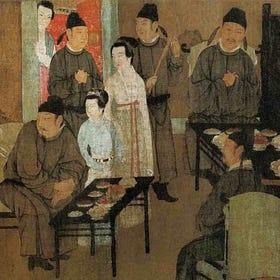Weekly Pose Ponder No. 20
Summarizing the week's posts -- Arendt, the history of economics and technology, the New Right, the history of philosophy without gaps, and Storythinking cont'd.
→ Note to readers: to receive one weekly digest instead of daily emails, change your delivery (notification) preferences here: Your Account.
My class on Arendt’s The Human Condition has started, so expect reflection forthcoming. See especially this past week’s post on life options. I also recommend the Byte-Sized History Substack, a video interview with Oren Cass, whom we’ve met before at Pose Ponder, and a long-running resource to learn philosophy online.
And: Storythinking, ch. 4.
Do you know anyone who might be interested in Pose Ponder? Please share! 😎
Intro: Arendt Coming Up
Welcome back after the break. Today is Intro-Meta Monday offering a short preview of what’s to come here at Pose Ponder over the next three weeks. Pose Ponder publishes daily on weekdays, 3 weeks on, 1 week off. My Arendt reading course on The Human Condition
Babies, Things, Wealth, Deeds, Words — or Nothing?
“Take only pictures. Leave only footprints.” So goes the admonition of rangers to wanderers in the nation’s parks. Don’t take anything that doesn’t belong to you. Don’t leave anything behind, except the barest trace of your having been there, an ephemera that will disappear with the next rain, wind, falling leaves, or passersby scuffling along the same p…
Byte-Sized History
Today’s featured Substack is Byte-Sized History by J. Michael Wahlen. Perhaps the most important type of history people need to have a better sense of today is economic history, ideally tied to the evolution of technology. Byte-Sized History satisfies this need with wide-ranging case studies on the big backstories that matter. Insightful storytelling com…
Re-alignment
In lieu of an original essay today, I highly recommend watching this interview by Freddie Sayers at UnHerd with Oren Cass of American Compass, who is one of the more intelligent and articulate masterminds of the New Right. He is a non-traditional economist in favor of defending workers, families, and the basic social fabric of American communities.
Resource: Where to Learn Philosophy
If you studied philosophy in any English-speaking college or university, you probably got a dose of Anglo-American analytic thought. Unless you are into philosophy of mind or philosophy of language, you may never have taken another philosophy course again. Even if you did, perhaps sampling some history of philosophy (ancients, moderns), it may still hav…








